 Petzlover
Petzlover Both Pixie-bob and Toyger are originated from United States. Both Pixie-bob and Toyger are having almost same weight. Both Pixie-bob and Toyger has same life span. Both Pixie-bob and Toyger has same litter size. Pixie-bob requires Low Maintenance. But Toyger requires Moderate Maintenance
Both Pixie-bob and Toyger are originated from United States. Both Pixie-bob and Toyger are having almost same weight. Both Pixie-bob and Toyger has same life span. Both Pixie-bob and Toyger has same litter size. Pixie-bob requires Low Maintenance. But Toyger requires Moderate Maintenance
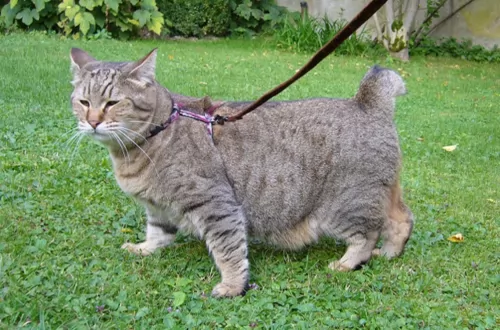 The Pixie-Bob breed is thought to have started from the unplanned litter of a bobcat and a barn cat in 1985. The whole idea of the Pixie-Bob was to get a cat that resembled the North American Bobcat.
The Pixie-Bob breed is thought to have started from the unplanned litter of a bobcat and a barn cat in 1985. The whole idea of the Pixie-Bob was to get a cat that resembled the North American Bobcat.
The barn cat belonged to Carol Ann Brewer, and she named a female kitten Pixie. Pixie became the foundation mother for this breed.
In fact, it was in 1989 that she wrote the first breed standard, naming the breed Pixiebob, in honor of Pixie. In 1998, the Pixiebob achieved TICA championship status. Today, the International Cat Association (TICA) recognizes the Pixie-Bob as a breed.
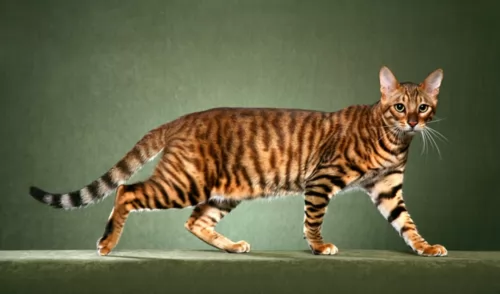 The Toyger is a domestic cat developed from breeding Shorthaired Tabbies to look like a small Tiger.
The Toyger is a domestic cat developed from breeding Shorthaired Tabbies to look like a small Tiger.
It has the striped coat of the Tiger. The person to develop the Toyger is Judy Sugden.
The unusual-looking cat has been recognized for registration by the International Cat Association in the 1990s. It was accepted as a full championship breed in 2007.
Today this designer cat is recognized by the ICA but not the Cat Fancier's Association.
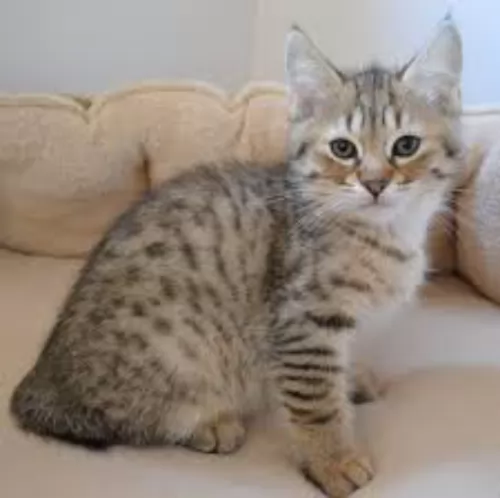 The Pixie-Bob is a medium to large cat that can weigh up to about 8kg. They stand between 25 and 33cm in height.
The Pixie-Bob is a medium to large cat that can weigh up to about 8kg. They stand between 25 and 33cm in height.
It's a muscular cat. These cats have a thick double coat which can be short-haired or long-haired. Most times they have a striped coat pattern with some rosettes. In fact, the pattern on the fur is much like that of a Bobcat.
Their eyes are triangular shaped and they have quite a distinctive heavy brow. The eyes are usually a honey color or they can be green. The tail is rumpy or non-existent or it can be a few inches in length. Sometimes the ears will have some feathering at the tips.
They are polydactyl which means that with their paws, they have more than the regular number of digits.
In spite of there being a wild side to this coat, they are amicable, fairly laid-back type of cats. Pixie-Bobs enjoy being with their owners, loving to quietly spend time with their human beings.
They’re not cats that form a strong bond with just one family member, but they are friendly with everyone in the family. When a stranger calls, they may run off however, to hide in a safe spot.
Some people describe them as dog-like. These cats also have a love for water so don’t be surprised if you see him spending a lot of time playing around his water bowl. This is a cat that just loves being the center of everything that is going on, and yet he has a calm aura about him.
The Pixiebob is talkative, chirping and chattering away as he tells you about what he has got up to during the day.
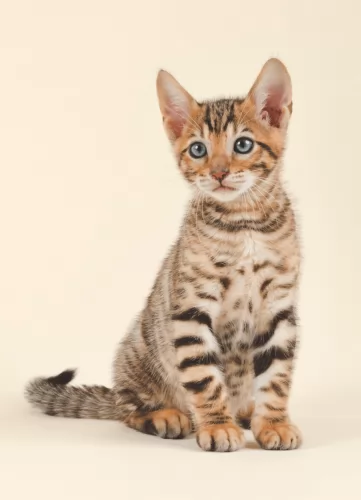 The Toyger is a medium to large-sized cat that can weigh between 5 and 9kg. As with any cat, with these newer kinds of cats, the size of the cat can vary.
The Toyger is a medium to large-sized cat that can weigh between 5 and 9kg. As with any cat, with these newer kinds of cats, the size of the cat can vary.
It is a shorthair cat that is quite a bit bigger than your regular cat. The coat of this mixed breed cat has markings similar to that of a tiger - vertical orange striping with rosettes.
The coat of the cat is short and he is a brown mackerel tabby with stripes being a dark brown to black. The eyes of the cat can be a blue, aquamarine, green, or gold.
These cats have a laid back disposition, and will comfortably slot into a busy household.
They are playful and intelligent and can be taught tricks and to walk on the lead.
This cat enjoys the company of people and will get on well with other pets too. People who have owned them say they are the most affectionate and loving cats there are and will enjoy being petted and pampered by their human family.
They get on well in busy households where there are children and other pets. They’re super smart and can be trained with ease.
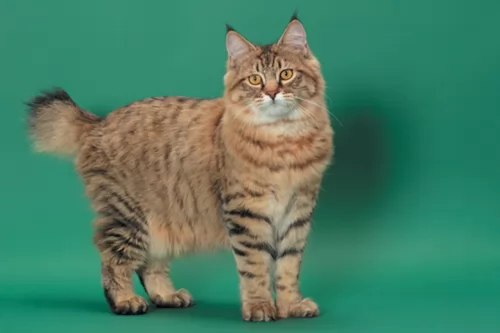 The Pixie-Bob just loves being around his human family and he forms strong bonds with them.
The Pixie-Bob just loves being around his human family and he forms strong bonds with them.
They are social cats and like a dog, they try to become involved in the going-on of the family. By treating this cat well and providing him with a loving home, he is capable of making you a most amicable and energetic member of the family.
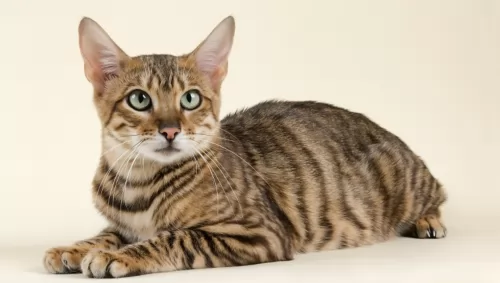 Toygers are expensive cats and there aren’t many breeders in the world. If you do decide to invest in a Toyger, he will need careful looking after, after all, you've spent a lot of money on him.
Toygers are expensive cats and there aren’t many breeders in the world. If you do decide to invest in a Toyger, he will need careful looking after, after all, you've spent a lot of money on him.
Diet is of absolute importance to keep such a cat healthy. The right environment is also important as cats and dogs for that matter too, can become ill and depressed if they find themselves in homes where they are unloved and abused.
Don't get a cat if you aren't prepared to love and care for him. Because the question is then 'why get a cat?'
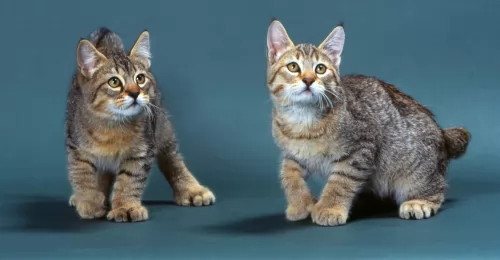 These are healthy cats and they don’t easily get sick. There are always some cat health issues that can crop up with any cat, and with the Pixie Bob, they seem to battle with delivering litters.
These are healthy cats and they don’t easily get sick. There are always some cat health issues that can crop up with any cat, and with the Pixie Bob, they seem to battle with delivering litters.
Sometimes you will hear of Cryptorchidism in these cats which means there is the absence of the testes or scrotum.
Whatever health issues your cat has, always make sure that you get him to the vet for his immunizations as well as for check-ups.
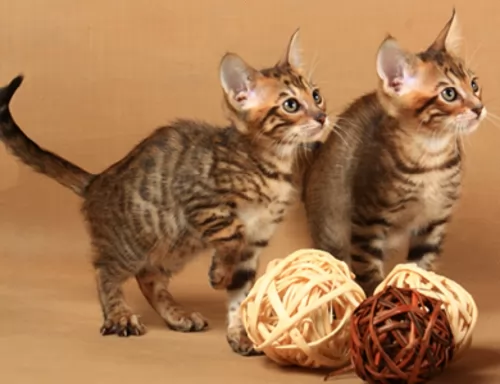 Just like in human beings, obesity can reduce the lifespan of your cat. Make sure you keep your Toyger’s weight under control.
Just like in human beings, obesity can reduce the lifespan of your cat. Make sure you keep your Toyger’s weight under control.
These cats are considered to be fairly healthy. He can be predisposed to some of the same cat conditions that the Bengal and Domestic Shorthair face.
When your Toyger shows any signs of illness, get him to the vet. Some of the common health problems your Toygers might have to contend with include obesity and heart murmurs.
A heart murmur is an abnormal heart sound, and is caused by turbulent blood flow within the heart. When you vet examines your cat, a heart murmur is detected when the vet listens to your cat's heart with a stethoscope. The vet will discuss with you the way forward for your cat.
If you get a Toyger kitten, you will have to make sure he is up to date with his vaccinations. This is part of being a responsible cat owner.
The breeder will have a record of his vaccinations and will hand this over to you.
At 6 – 8 weeks kittens start with their first injections which include vaccinations for distemper, feline rhinotracheitis, and feline calici virus.
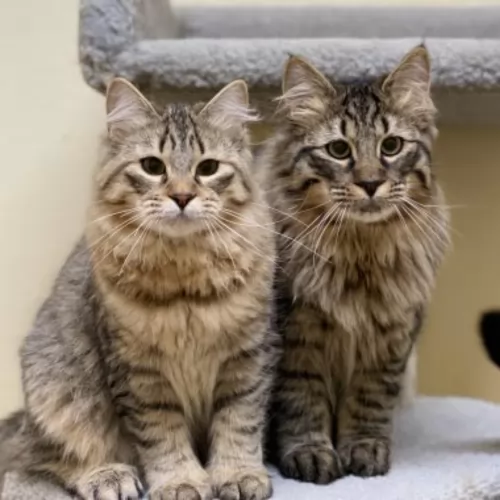 Pixie-bobs don’t require any special diet. When it comes to commercially manufactured cat foods, there are wet foods, dry foods and combination foods. You’ll find out what your cat likes, but remember that a cat is a carnivore and that meat is what they eat.
Pixie-bobs don’t require any special diet. When it comes to commercially manufactured cat foods, there are wet foods, dry foods and combination foods. You’ll find out what your cat likes, but remember that a cat is a carnivore and that meat is what they eat.
Always go for high-quality foods if you are able to because the best foods are better able to keep your cat healthy. The nutritional needs of a cat change as he grows and matures and there are cat foods specially manufactured for every season of your Pixie-Bob’s life.
Always ensure that there is a bowl of clean, fresh, cool water available to your cat.
The short hair of the Pixie-Bob means that it will be easy to give your cat a brush once a week to remove loose hairs.
Always get your cat to the vet when he shows signs of illness. If he comes to you as a kitten he will need his vaccinations as well as worm medicine. Your vet will inform you when to bring you cat in for the next round of vaccinations.
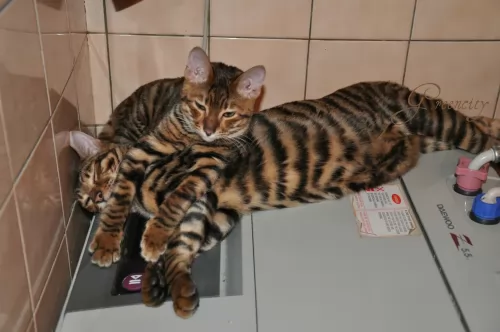 Toygers should be brushed weekly and have their nails trimmed regularly. As with all domesticated cats, you should check inside his ears to make sure they don’t become clogged with dirt and wax.
Toygers should be brushed weekly and have their nails trimmed regularly. As with all domesticated cats, you should check inside his ears to make sure they don’t become clogged with dirt and wax.
These are smart cats so they will need to be provided with attention in the form of clever games and toys that get him thinking.
Toygers need to be fed much like any other domestic cat. The most important thing to remember when feeding a cat is that they are carnivores and they require meaty food high in protein.
Speak to your vet about the absolute necessity of getting your cat’s diet right. For your convenience, cat food manufacturers have brought out many excellent cat foods that cater to the time of life your cat is in.